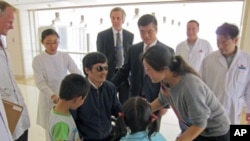Chinese activist Chen Guangcheng, who is in a Beijing hospital after leaving the U.S. embassy on Wednesday, says he wants to meet visiting U.S. Secretary of State Hillary Clinton and be allowed safe passage with his family to the United States. U.S. lawmakers and American-based human rights activists are also urging help for the blind activist who has spoken out against forced abortions and sterilizations in China.
During a Thursday hearing of the Congressional-Executive Commission on China, Republican Representative Chris Smith of New Jersey spoke with Chen by cell phone.
Chen said he wants to meet with Secretary Clinton, to thank her and ask her for more help to go to the United States so he can rest. He added that he is worried about the safety of his relatives in eastern Shandong province, where he was under house arrest. Chen also requested that his freedom of movement be guaranteed.
He spoke from a hospital in Beijing, where he has been staying with his wife and two children, while being treated for a foot injury. Friends and activists in Beijing say they have been prevented access to the hospital.
A senior State Department official said there are indications that U.S. officials will be able to see Chen on Friday. Clinton, who is in Beijing, where she has spoken about the importance of human rights in China, has not mentioned Chen publicly.
Human rights activists say they have received reports that Chen might have been coerced into leaving the U.S. embassy in Beijing, just as Secretary Clinton and Treasury Secretary Timothy Geithner arrived for security and economic talks.
U.S. officials say Chen left the embassy willingly, after an agreement was reached with Chinese authorities to allow the eventual relocation of his family and grant Chen permission to study law at a university in China.
During the hearing, Representative Smith expressed displeasure with the deal.
“There are many questions and there are even more concerns. How will the United States and China agreement on Chen and his family’s safety be enforced? What happens if Chen or any member of his family suffers retaliation” he said.
Another Republican representative, Frank Wolf of Virginia, promised an investigation.
“Was there any coercion, subtle coercion, forced coercion or pressure involved? What were the internal State Department and White House deliberations? When the dust settles ((i,e., soon)), I intend to formally request to review all cable traffic, classified or otherwise, that surrounded these negotiations,” he said.
Wolf said what initially seemed to be a diplomatic triumph, when Chen fled house arrest to the safety of the U.S. embassy, has turned into a “diplomatic fiasco.”
Pastor Bob Fu, president of the U.S-based Christian human rights group ChinaAid, told the hearing that he was shocked and disappointed by Chen’s departure from the U.S. embassy.
“Why is there no other option on the table offered to Chen? For instance, why would the U.S. embassy not tell Chen that, 'You have a choice, that you can stay, we can continue to negotiate with the Chinese government to allow your wife and two children to come to the U.S. embassy, so that you can have a safe environment to discuss your future," he said.
Other activists said there are reports of a new crackdown on activists close to Chen and on others seeking broader human rights in China. They said it is important for U.S. officials to take these matters seriously and to take bold action to secure Chen’s freedom.
Chen was released from four years in prison in 2010 and was placed under house arrest. Chen, who is self-taught in law, has been an outspoken critic of forced abortions and sterilizations in China.
News
Chinese Dissident Wants to Meet Clinton, Go to US




